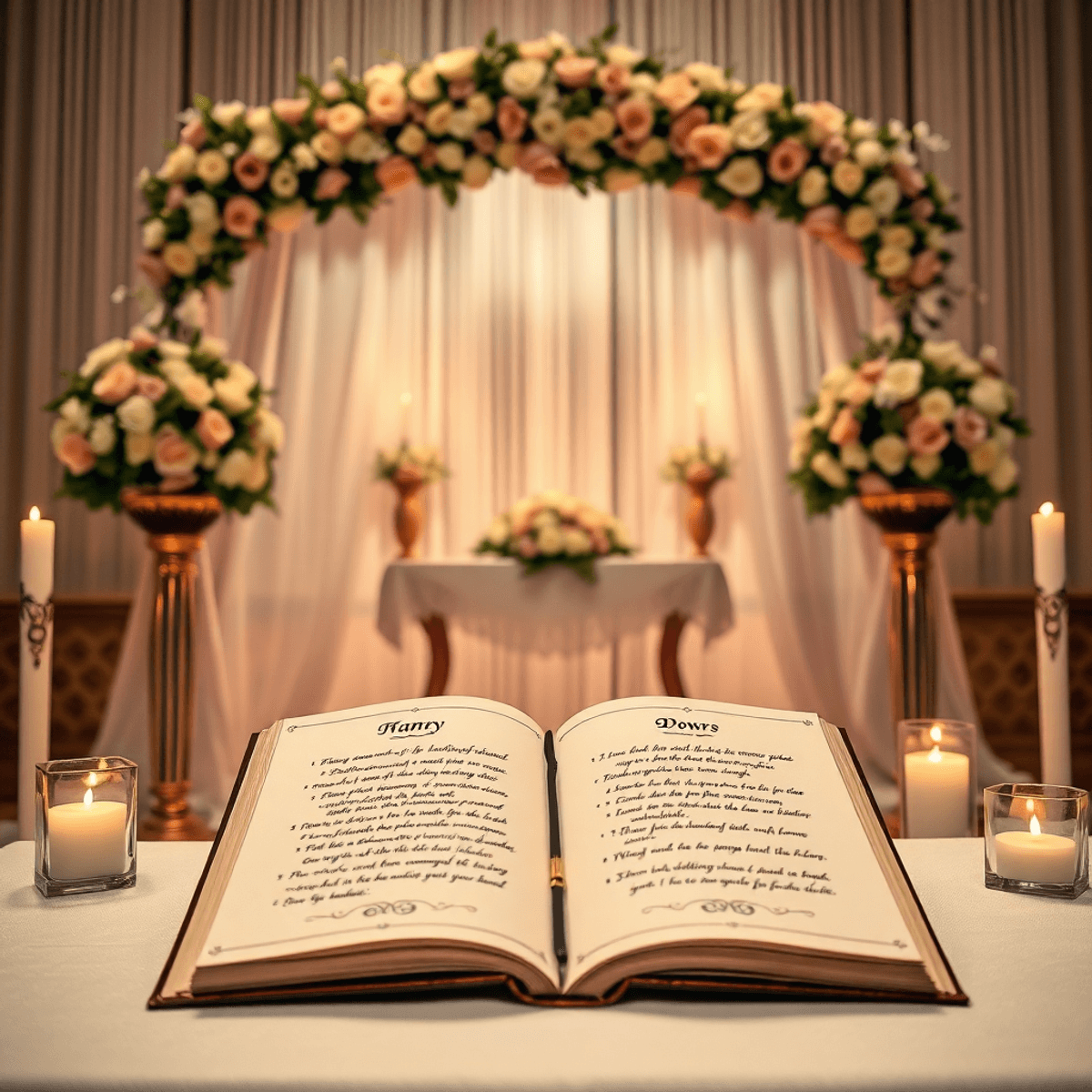wedding wedding vows

The Importance of Wedding Vows in Marriage Ceremonies
Wedding vows are more than just words spoken during a ceremony; they are heartfelt promises that capture the essence of a couple’s commitment to each other.
What Are Wedding Vows?
Wedding vows are formal declarations made by partners, affirming their dedication and love. These vows can vary greatly based on cultural, religious, or personal beliefs.
Why Are Vows Important in Marriage Ceremonies?
Vows are often considered the emotional centerpiece of wedding ceremonies, symbolizing the couple’s union. Many cultures view the exchange of vows as a sacred moment, integral to the marriage contract.
 How Do Vows Express Commitment?
How Do Vows Express Commitment?
Vows articulate the promises each partner makes, reinforcing their love and support. Common themes include loyalty, respect, and partnership, emphasizing a lifelong commitment through life’s ups and downs.
The significance of wedding vows goes beyond tradition; they lay the foundation for a successful relationship built on mutual respect and understanding.
Exploring Traditional Wedding Vows Across Cultures
Christian Wedding Vows: A Testament to Faithfulness and Lifelong Commitment
Christian wedding vows are a powerful expression of commitment, reflecting deep-rooted values of faithfulness in marriage and the promise to love one another. These traditional wedding vows often encapsulate essential promises that couples make to each other, emphasizing a lifelong partnership grounded in love and loyalty.
Typical phrases found in Christian vows include:
- “To have and to hold, from this day forward.”
- “For better or for worse, in sickness and in health.”
- “Until death do us part.”
These expressions resonate with the idea of unconditional love and support through various life circumstances, similar to the promise to love and cherish one another. They serve as reminders that marriage is not merely a legal contract but a sacred covenant enriched by spiritual significance.
The Significance of Lifelong Commitment
In Christian marriage ceremonies, the emphasis on lifelong commitment is paramount. This concept is deeply intertwined with Biblical teachings, where marriage is viewed as an enduring union blessed by God. Couples often draw inspiration from scripture, such as:
“Therefore what God has joined together, let no one separate.” (Mark 10:9)
Such verses reinforce the belief that marriage is intended to be a permanent bond, whether in wealth or poorer times. The ritualistic recitation of these vows during the ceremony solidifies the couple’s intentions before their loved ones and their faith community.
The exchange of vows not only marks the beginning of a shared journey but also serves as a public declaration of fidelity. Each phrase embodies promises that extend beyond mere words; they represent hopes for a future filled with trust, respect, and unwavering support.
As couples navigate through life’s challenges together, these vows act as anchors—reminders of their original commitments during times of trial or joy. In this way, traditional Christian wedding vows play an essential role in nurturing relationships built on faithfulness and mutual devotion.
Jewish Wedding Vows: Infusing Love and Tradition with Hebrew Phrases
Jewish wedding traditions are rich with symbolism and meaning. One of the most cherished aspects is the ring exchange, a moment filled with love and commitment. During this ceremony, the groom places a ring on the bride’s finger, accompanied by the phrase, “Harei at mekudeshet li,” meaning “Behold, you are consecrated to me.” This declaration encapsulates the essence of their vows—binding them in a sacred union.
Jewish wedding vows often incorporate Hebrew phrases that reflect deep spiritual significance. The use of these phrases serves not only as promises but also as blessings over the marriage. For instance:
- Kiddushin: The sanctification of marriage
- Chuppah: Symbolizing the home they will build together
These elements highlight the profound commitment inherent in Jewish marriages.
Cultural variations in marriage ceremonies can be seen globally; just as Christian wedding vows emphasize faithfulness in marriage, Jewish vows intertwine love and tradition uniquely.
Hindu Wedding Vows: Taking Sacred Steps Together Through the Saptapadi Ritual
In Hindu weddings, the saptapadi, or Seven Steps, serves as a profound expression of commitment and unity between partners. This ritual involves the couple taking seven steps together, with each step representing a specific vow they make to one another. Here’s a glimpse into this sacred process:
- First StepTo nourish each other and to promise to love through all of life’s challenges.
- Second StepTo develop strength together as you write your own vows and face life’s challenges.
- Third StepTo create wealth and prosperity as you build your life together.
- Fourth Step: To share joy and sorrow.
- Fifth StepTo care for family and friends while also promising to love each other unconditionally.
- Sixth Step: To remain faithful and loyal.
- Seventh Step: To always be friends in life’s journey.
The cultural significance of the saptapadi is profound. The couple circles a sacred fire, known as Agni, which acts as a witness to their promises. Fire, symbolizing purity and transformation, elevates the vows taken during this ceremony to a spiritual level.
This tradition reflects how different cultures approach wedding vows through unique rituals. While Christian wedding vows emphasize faithfulness in marriage with phrases like “until death do us part,” Hindu rituals highlight the importance of shared life paths and mutual support.
The vibrant tapestry of wedding vows across cultures invites exploration into various traditions that shape marital commitments worldwide, including examples of wedding vows.
Muslim Wedding Vows: Nurturing Love, Respect, and Support in Islam
Muslim wedding vows embody the essence of partnership founded on mutual respect and love. These promises reflect the values of Islam, emphasizing the significance of obedience and support in a marital relationship.
Common pledges made during Muslim ceremonies often include:
- Commitment to Partnership: Couples vow to support each other emotionally and spiritually throughout their lives.
- Mutual Respect: Acknowledging each other’s dignity and individuality is central to these vows.
- Faithfulness in Marriage: Just as seen in Christian wedding vows, the concept of loyalty remains vital.
The notion of obedience within this context is not about submission but rather about fostering an environment where both partners can thrive. This balance nurtures a loving relationship built on trust and teamwork, essential for a successful life together.
Different cultures approach wedding vows with unique customs. For example, while traditional wedding vows may vary across religions, the core values of love and commitment unite them.
Personalizing Your Wedding Vows: Tips for Writing Meaningful Promises
Creating personalized vows adds a heartfelt touch to your wedding ceremony. Tailoring your promises to reflect your unique relationship can deepen the emotional connection between you and your partner. Here are some benefits of writing personal vows:
- AuthenticityYour words will resonate more when they come from the heart, showcasing your true feelings as you write your own wedding vows.
- Shared Memories: Incorporating personal anecdotes can evoke special moments that have defined your relationship.
- Connection is vital for couples to promise to love each other throughout their journey together.: Intimate wedding vows create a sense of bond, reminding both partners of their commitment.
To craft sincere and heartfelt promises, consider these practical tips:
- Reflect on Your Relationship: Think about what makes your partnership special. What do you love most about each other?
- Set the Tone: Decide whether you want your vows to be romantic, humorous, or a mix of both. This sets the style for your writing.
- Be Specific: Include details that highlight your journey together, such as shared experiences or future aspirations.
- Practice Out Loud: Reading your vows aloud can help you adjust phrasing and ensure they flow naturally.
These steps will guide you in creating wedding vows that are not only meaningful but also resonate deeply with both you and your partner.
Canyon Lake Texas: The Perfect Venue for Your Dream Wedding Ceremony and Vow Exchange
Canyon Lake, Texas, offers a breathtaking backdrop for couples ready to exchange their wedding vows on their special wedding day. Surrounded by stunning natural beauty, the serene atmosphere creates an unforgettable setting for your special day. Here are some highlights:
Picturesque Scenery
Lush greenery and sparkling waters provide a romantic ambiance, perfect for capturing those cherished moments.
Popular Venues
- Canyon Lake Cabins: Offers charming accommodations with scenic views ideal for intimate ceremonies.
- The Gristmill River Restaurant & Bar: A unique spot featuring beautiful outdoor spaces alongside the river.
- The Lakehouse is the perfect venue for couples to exchange their traditional vows.: Known for its picturesque lakeside setting and elegant indoor options.
Choosing Canyon Lake as your venue guarantees a magical experience as you declare your love and commitment through your wedding vows. This enchanting location will enhance the memory of your ceremony for years to come.



